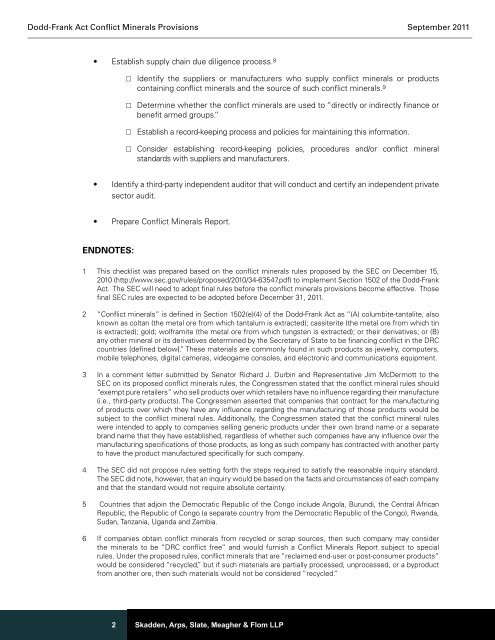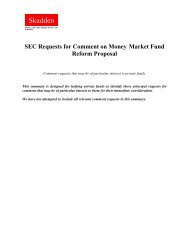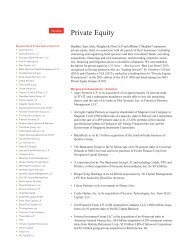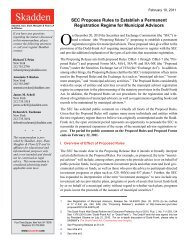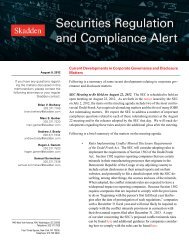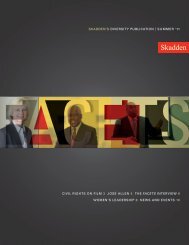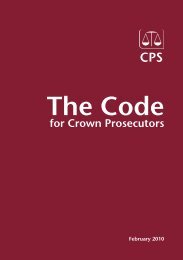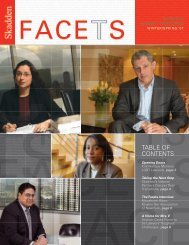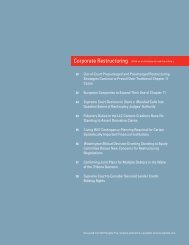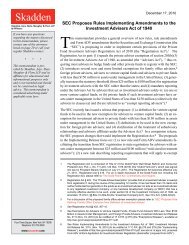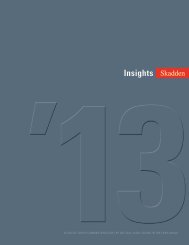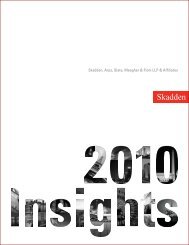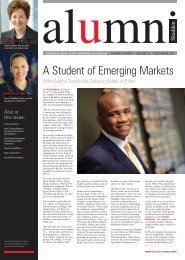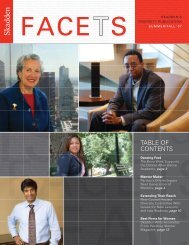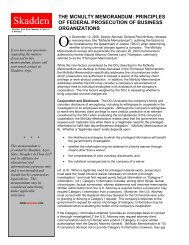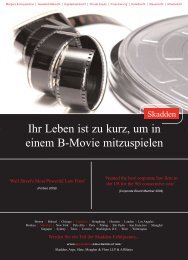Dodd-Frank Act Conflict Minerals Provisions - Skadden
Dodd-Frank Act Conflict Minerals Provisions - Skadden
Dodd-Frank Act Conflict Minerals Provisions - Skadden
You also want an ePaper? Increase the reach of your titles
YUMPU automatically turns print PDFs into web optimized ePapers that Google loves.
2<br />
<strong>Dodd</strong>-<strong>Frank</strong> <strong>Act</strong> <strong>Conflict</strong> <strong>Minerals</strong> <strong>Provisions</strong> September 2011<br />
• Establish supply chain due diligence process. 8<br />
□ Identify the suppliers or manufacturers who supply conflict minerals or products<br />
containing conflict minerals and the source of such conflict minerals. 9<br />
□ Determine whether the conflict minerals are used to “directly or indirectly finance or<br />
benefit armed groups.”<br />
2<br />
□ Establish a record-keeping process and policies for maintaining this information.<br />
□ Consider establishing record-keeping policies, procedures and/or conflict mineral<br />
standards with suppliers and manufacturers.<br />
• Identify a third-party independent auditor that will conduct and certify an independent private<br />
sector audit.<br />
• Prepare <strong>Conflict</strong> <strong>Minerals</strong> Report.<br />
ENDNOTES:<br />
1 This checklist was prepared based on the conflict minerals rules proposed by the SEC on December 15,<br />
2010 (http://www.sec.gov/rules/proposed/2010/34-63547.pdf) to implement Section 1502 of the <strong>Dodd</strong>-<strong>Frank</strong><br />
<strong>Act</strong>. The SEC will need to adopt final rules before the conflict minerals provisions become effective. Those<br />
final SEC rules are expected to be adopted before December 31, 2011.<br />
2 “<strong>Conflict</strong> minerals” is defined in Section 1502(e)(4) of the <strong>Dodd</strong>-<strong>Frank</strong> <strong>Act</strong> as “(A) columbite-tantalite, also<br />
known as coltan (the metal ore from which tantalum is extracted); cassiterite (the metal ore from which tin<br />
is extracted); gold; wolframite (the metal ore from which tungsten is extracted); or their derivatives; or (B)<br />
any other mineral or its derivatives determined by the Secretary of State to be financing conflict in the DRC<br />
countries [defined below].” These materials are commonly found in such products as jewelry, computers,<br />
mobile telephones, digital cameras, videogame consoles, and electronic and communications equipment.<br />
3 In a comment letter submitted by Senator Richard J. Durbin and Representative Jim McDermott to the<br />
SEC on its proposed conflict minerals rules, the Congressmen stated that the conflict mineral rules should<br />
“exempt pure retailers” who sell products over which retailers have no influence regarding their manufacture<br />
(i.e., third-party products). The Congressmen asserted that companies that contract for the manufacturing<br />
of products over which they have any influence regarding the manufacturing of those products would be<br />
subject to the conflict mineral rules. Additionally, the Congressmen stated that the conflict mineral rules<br />
were intended to apply to companies selling generic products under their own brand name or a separate<br />
brand name that they have established, regardless of whether such companies have any influence over the<br />
manufacturing specifications of those products, as long as such company has contracted with another party<br />
to have the product manufactured specifically for such company.<br />
4 The SEC did not propose rules setting forth the steps required to satisfy the reasonable inquiry standard.<br />
The SEC did note, however, that an inquiry would be based on the facts and circumstances of each company<br />
and that the standard would not require absolute certainty.<br />
5 Countries that adjoin the Democratic Republic of the Congo include Angola, Burundi, the Central African<br />
Republic, the Republic of Congo (a separate country from the Democratic Republic of the Congo), Rwanda,<br />
Sudan, Tanzania, Uganda and Zambia.<br />
6 If companies obtain conflict minerals from recycled or scrap sources, then such company may consider<br />
the minerals to be “DRC conflict free” and would furnish a <strong>Conflict</strong> <strong>Minerals</strong> Report subject to special<br />
rules. Under the proposed rules, conflict minerals that are “reclaimed end-user or post-consumer products”<br />
would be considered “recycled,” but if such materials are partially processed, unprocessed, or a byproduct<br />
from another ore, then such materials would not be considered “recycled.”<br />
2<br />
<strong>Skadden</strong>, Arps, Slate, Meagher & Flom LLP


